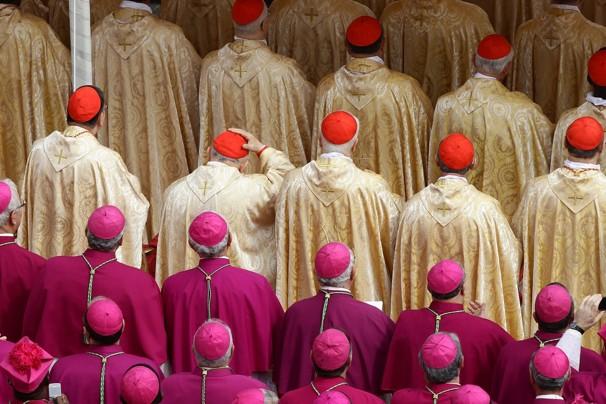Is the Church Corrupt?
By Anthony M. Stevens-Arroyo
The trial of Msgr. William J. Lynn, secretary for clergy under a late Philadelphia cardinal, exposes every day what Pope Benedict XVI has called "the filth of the church." As the New York Times explained, Lynn is "the first Roman Catholic supervisor in the country to be tried on felony charges of endangering children and conspiracy — not on allegations that he molested children himself." If the allegations that Lynn ignored child sexual abuse are true, file the Philadelphia case as another clerical cover-up that will have irrevocably stained the church's image. If this major scandal were not enough, other Catholic news haunts the conscience: According to a report by Reuters, JP Morgan closed the Vatican's bank account for "lack of transparency." Catholic nuns in America, who power the nation's Catholic hospitals, schools and social service organizations are under attack from the Vatican. Pedophilia has put mighty Irish Catholicism "at the breaking point." Facing the scope of these stories, Catholics can legitimately ask: "Is the church corrupt?" The answer to that question depends on perspective. If people join the church as sinners in order to become saints, human failures are no big surprise. If most priests and faithful live the Gospel, why label the whole institution as "corrupt"? Haven't we heard this charge many times in history? Although Catholicism has reformed itself in the past and is the world's largest Christian church, the corruption question can't be dismissed by platitudes, especially when Catholicism is looked at sociologically. In fact, today's scandals might be of less concern than what can be called "structural deficits." The routine dissent from church teachings by church-going laity – use of contraception, divorce and remarriage outside the church, unwed couples living together, etc. – represents the loss of a trusting base. Dwindling church membership, the graying of the remaining faithful, the closing of schools and hospitals, diocesan bankruptcies, a shrinking number of clergy, a persistent refusal to include married men in the ranks of the clergy -- these are realities that spell institutional doom, pushing believers to separate devotion to Jesus from faith in the church. In purely human terms, the Catholic Church seems condemned to inevitable decline. Addressing the battle with ecclesiastical corruption, theologian Karl Rahner compared to church to the woman caught in adultery brought before Christ (John. 9:3-11). Now, as then, the Savior answers: "Let he who is without sin among you cast the first stone." In fact, every institution (e.g. Wal-Mart ) faces the cancer of corruption. As the human expression of Christ's church, Catholicism will never be perfect; perhaps only less imperfect. My none-too-scientific survey of people in the pews found reasons for Catholic hope. Lay persons are smarter than some think: We can handle a field with both wheat and tares (Mt. 13:24-30). We see which clergymen are pastoral and which are not -- and we donate our time and money accordingly. We rejoice that most priests have it just right. The Catholic commitment to social justice is indelible in our consciences, even if we differ about how government tax money is used for the poor. We oppose abortion as a "method of birth control," but think changing the social environment that leads women to abortion is more effective than changing Supreme Court justices. Almost all of us know someone among family or friends who is gay, and we are more interested in seeing them live happily than punishing them with restrictive laws. Yes, we wish for a perfect Catholic world where both young people would be virgins on their wedding day, where people dressed in Sunday-best for Mass and each sermon was like a masterpiece delivered by the late Fulton Sheen. But we recognize human limitations, consoling ourselves with the wisdom of the Spanish adage: "No hay bien que por mal no venga./ Every good things come to us out of something bad." Catholics are loyal enough to Jesus and to each other to prevail against the Gates of Hell that now besmirch the institutional church.
|
.
Any original material on these pages is copyright © BishopAccountability.org 2004. Reproduce freely with attribution.
